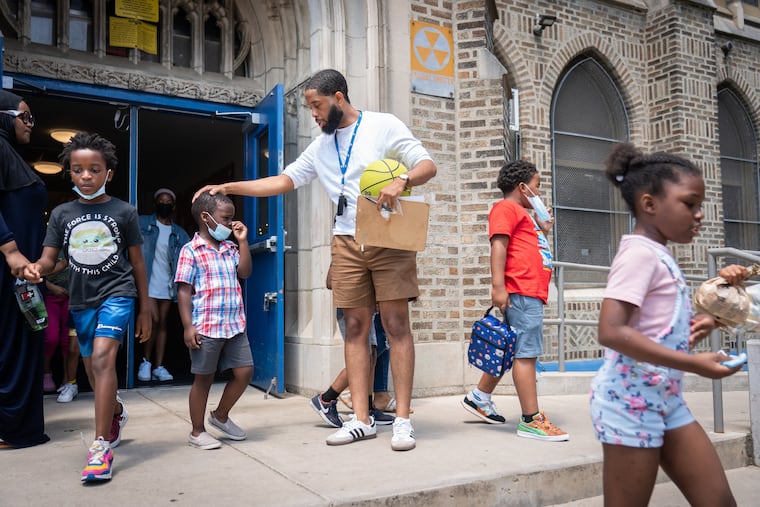More than jitters: A psychologist gives tips on back-to-school anxiety
“Where we see anxiety and jitters start to become a problem is if they start to really interfere with different aspects of our lives," said Nicole Fleischer, a pediatric psychologist.

Back-to-school jitters? Children all across the Philadelphia region are starting a new academic year over the next couple of weeks, and the nerves some are feeling might be a little more than that.
The transition back to the classroom may be especially challenging after the last two years of school were disrupted by COVID-19. Health authorities have been warning of a crisis in youth mental health.
» READ MORE: Monday is the first day of class for Philly’s superintendent, too. Here’s his preview of the school year.
Some nerves are normal. But when anxiety starts being disruptive, Nicole Fleischer, a pediatric psychologist at St. Christopher’s Hospital for Children, sees cause for concern.
Parents won’t be able to solve all of their children’s problems, but they play a critical role providing a space for them to talk about their feelings and strategizing ways to cope.
Here’s how to help your child with back-to-school anxiety:
How do I know if my child is experiencing anxiety, not normal jitters?
Young children may complain of a stomachache or refuse breakfast, while teenagers may isolate or lash out more. These and other behaviors, such as refusing to go to school, can be signs of anxiety that require extra support. Poor academic performance and abnormal behavior at school may also be signs, though they may take longer to show up.
Anxiety may be harder to recognize among kids who are extremely nervous about their grades but still doing well. Talk to them and together develop a plan for coping when things don’t go exactly as planned.
How do I help my child with separation anxiety?
Separation anxiety is particularly common among younger children, Fleischer said. They might have thoughts like “What if Mommy doesn’t come pick me up?”
Fleischer recommends reassuring them with facts: “Mommy will be back at 3 o’clock to pick you up from school.”
But she cautioned against making promises you can’t keep, she said. For instance, don’t attempt to excite your child about school by promising every kid in the class will want to be their friend. An anxious child may turn that well-intended reassurance into a worry that some kids might not want to be their friend.
There’s a balance between reassuring children and promising that nothing bad will ever happen.
A morning routine that includes fun distractions can help little ones not think about their concerns on the way to school.
“Having a special song that they listen to on their way [to school] can add a little bit of distraction,” Fleischer said.
» READ MORE: CHOP’s only psychiatrist for infants is worried about the mental health of Philadelphia’s youngest
How do I help teens cope with anxiety?
There are many reasons a teen might be anxious about going to school: bullying, pressure of academics, news of school shootings, persistence of gun violence in Philadelphia, or feelings of isolation.
The best way to respond to teens’ concerns depends on what triggers their anxiety, Fleischer says.
“Be curious about what are their fears,” she said.
Relaxation techniques, such as deep breathing or progressive muscle relaxation, can help a teen start the day and arrive at school less anxious. Fleischer recommends looking for scripts online and YouTube videos that can help with these practices.
Sometimes teen anxiety fixates on a specific scenario, for instance bullying or gun violence. In these cases, Fleischer recommends making a plan by identifying the student’s support options. “What would the child do if they were bullied? Who can they go to in the school to report the bullying?” Fleischer said.
And teens who struggle socially might benefit from activities outside of school where they can use their strengths and be with like-minded peers.
» READ MORE: Philly’s school year looms. So does the city’s gun violence.
When should I get professional help?
Talk to your child’s school about any concerns, even if they seem minor. Teachers and staff might notice changes during school hours — such as a student being distracted in class or sitting alone at recess — and can help parents come up with a plan.
Mental health professionals are also available to help.
“Give your child or adolescent a place where they can talk about things that are upsetting them and learn how to problem-solve,” Fleischer said.
» READ MORE: Tips from three Philly-area mental health providers about making sure your therapist is the best match
How to find help
- The 988 Suicide & Crisis Lifeline offers help in over 150 languages. Call or text 988. En Español, marca al 1-888-628-9454. If you're deaf or hard of hearing, call 1-800-799-4889.
- The Philadelphia Suicide and Crisis Center offers guidance and assessment about depression, self harm, hopelessness, anger, addiction, and relationship problems, at 215-686-4420.
- Veterans Crisis Chat is available at 1-800-273-8255 or by text at 838255.
- The Trevor Project offers crisis support to LGBTQ+ youth 25 and under. Call 1-866-488-7386, text START to 678678, or start a chat.